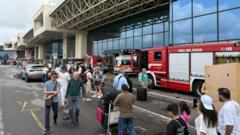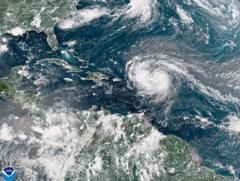In July 2025, a pervasive heat wave strained communities in Eastern Europe, igniting protests in Serbia and leading to widespread ecological issues such as dead fish clogging rivers. As temperatures soared to 106 degrees Fahrenheit, residents faced the dual challenge of high temperatures and environmental pollution, particularly in Albania, where a municipal fire collapsed into chaos.
Heat Wave Fuels Unrest and Ecological Crisis Across Eastern Europe

Heat Wave Fuels Unrest and Ecological Crisis Across Eastern Europe
A relentless heat wave exacerbates tensions in Eastern Europe, causing ecological disasters and prompting protests as communities struggle to cope with extreme temperatures.
The heat wave sweeping across Eastern Europe this week has created a backdrop of rising tensions and ecological distress as temperatures reached alarming highs. Protests erupted in Serbia, while in the Czech Republic, rivers were left marred by dead fish, highlighting the acute environmental challenges spurred by climate change.
In Albania, the soaring temperatures were particularly evident in the central town of Elbasan, where a routine summer fire at a local dump spiraled out of control. Firefighters, struggling against temperatures that peaked at 106 degrees Fahrenheit (41 degrees Celsius), faced daunting challenges as toxic smoke spread through the area. Protesters gathered outside the Ministry of Tourism and Environment in Tirana, voicing their discontent over pollution conditions and dubbing the ministry “the Ministry of Smoke and Pollution.”
As the heat takes its toll, older populations in Albania are feeling particularly vulnerable. Fatmir Dervishaj, a 76-year-old resident, expressed her sense of isolation, stating, “Summer may be joyful for many, but for me, it feels very isolating.”
In contrast to the hardship endured by many, some individuals have found financial opportunities amid the sweltering conditions. Ermir Metushi, a taxi driver in Tirana, noted increased earnings as more people opted for rides in air-conditioned taxis, even for short distances, due to the unbearable heat. He acknowledged the influx of tourists, which further boosted his business, allowing him to find a silver lining amidst the oppressive climate.
As the situation unfolds, Eastern European nations grapple with the contrasting experiences of their citizens, navigating both the discomfort of extreme heat and the emerging economic realities.



















